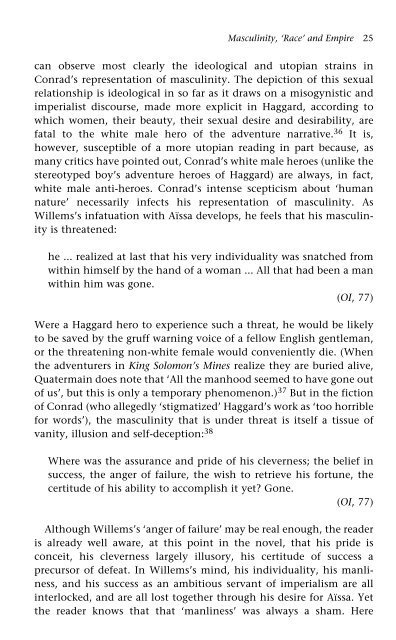Conrad and Masculinity
Conrad and Masculinity
Conrad and Masculinity
Create successful ePaper yourself
Turn your PDF publications into a flip-book with our unique Google optimized e-Paper software.
<strong>Masculinity</strong>, ‘Race’ <strong>and</strong> Empire 25<br />
can observe most clearly the ideological <strong>and</strong> utopian strains in<br />
<strong>Conrad</strong>’s representation of masculinity. The depiction of this sexual<br />
relationship is ideological in so far as it draws on a misogynistic <strong>and</strong><br />
imperialist discourse, made more explicit in Haggard, according to<br />
which women, their beauty, their sexual desire <strong>and</strong> desirability, are<br />
fatal to the white male hero of the adventure narrative. 36 It is,<br />
however, susceptible of a more utopian reading in part because, as<br />
many critics have pointed out, <strong>Conrad</strong>’s white male heroes (unlike the<br />
stereotyped boy’s adventure heroes of Haggard) are always, in fact,<br />
white male anti-heroes. <strong>Conrad</strong>’s intense scepticism about ‘human<br />
nature’ necessarily infects his representation of masculinity. As<br />
Willems’s infatuation with Aïssa develops, he feels that his masculinity<br />
is threatened:<br />
he ... realized at last that his very individuality was snatched from<br />
within himself by the h<strong>and</strong> of a woman ... All that had been a man<br />
within him was gone.<br />
(OI, 77)<br />
Were a Haggard hero to experience such a threat, he would be likely<br />
to be saved by the gruff warning voice of a fellow English gentleman,<br />
or the threatening non-white female would conveniently die. (When<br />
the adventurers in King Solomon’s Mines realize they are buried alive,<br />
Quatermain does note that ‘All the manhood seemed to have gone out<br />
of us’, but this is only a temporary phenomenon.) 37 But in the fiction<br />
of <strong>Conrad</strong> (who allegedly ‘stigmatized’ Haggard’s work as ‘too horrible<br />
for words’), the masculinity that is under threat is itself a tissue of<br />
vanity, illusion <strong>and</strong> self-deception: 38<br />
Where was the assurance <strong>and</strong> pride of his cleverness; the belief in<br />
success, the anger of failure, the wish to retrieve his fortune, the<br />
certitude of his ability to accomplish it yet? Gone.<br />
(OI, 77)<br />
Although Willems’s ‘anger of failure’ may be real enough, the reader<br />
is already well aware, at this point in the novel, that his pride is<br />
conceit, his cleverness largely illusory, his certitude of success a<br />
precursor of defeat. In Willems’s mind, his individuality, his manliness,<br />
<strong>and</strong> his success as an ambitious servant of imperialism are all<br />
interlocked, <strong>and</strong> are all lost together through his desire for Aïssa. Yet<br />
the reader knows that that ‘manliness’ was always a sham. Here




